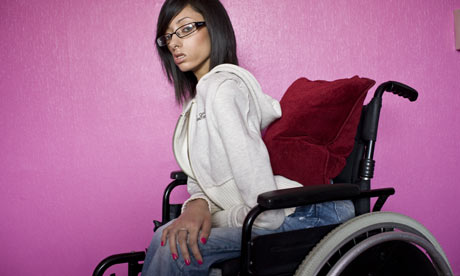
From the day I was born I have never smiled. As a child I don't think I ever questioned it. It sounds bizarre, but I never acknowledged that it was a physical impossibility. The first time the seriousness of it really hit me was when I was in my teens. People would look at me and say, "Smile! It may never happen!" Photographers would call out, "Smile!" I'd sigh, roll my eyes and feel humiliated.
My parents, of course, noticed much earlier. When I was a young child, they took me to a doctor but were told I was probably a late developer. When nothing changed, they took me back. From that moment, I was constantly visiting hospitals and consultants, being prodded and examined. But it wasn't until I was 10 that I was finally diagnosed with FSHD - facioscapulohumeral muscular dystrophy. This rare genetic condition affects the muscles in the face, shoulders and upper arms. It causes a progressive weakening of skeletal muscles. Some may find their bodies are weakened: others, such as me, face harsher circumstances.
When I was 12, I started to limp and was constantly out of breath. By 14, it took all my strength even to lift a foot. My spine developed a curve and I became a permanent wheelchair-user. That was the worst moment of my life; it felt as if one minute I was a happy, carefree girl who could do whatever I wanted and the next I was confined to a piece of metal. I closed off from the world and felt totally lost.
Yet my disability taught me not to take anything for granted. I had to toughen up and learn to laugh when people looked down on me. And although, for a long time, I thought I would never be independent, I have discovered I can do anything I want to. One thing I will never do, however, is smile.
People's smiles are often the first thing I notice. I think of Mother Teresa's quote, "We shall never know all the good that a simple smile can do", and realise that it's true. I know a smile can light someone's day and break the ice.
Although it seems like a small thing, there are times when it can be really distressing. One day, I was happily clothes shopping with a friend, as usual admiring the shoe section. As I tried on a pair of gorgeous hot-pink high heels a cute, blond-haired little boy came to stand by my wheelchair. He was no more than two or three years old and as he gazed up at me he fiddled nervously with the action-man figure in his hands. I looked away, thinking, "Bless him." When after a minute or two I noticed that he was still there, I glanced at him again. Unexpectedly his face broke into a shy smile. The look on his face and his blue eyes willed me to smile back. And at that moment, I wished more than ever that I could return it. When I couldn't, I felt terrible. He looked back at my unmoving face so upset, scared and confused and I just didn't know what to do. His mother came to pull him away, shooting me a disgusted look. And I felt the familiar emotion I felt as a child, the one that's persistently nudging me, telling me that I'm different and will never entirely belong.
It is frustrating to think that people might be left with a bad impression of me because my face looks cold and aloof. I must admit, when meeting someone new, the first thought that pops into my head is, "Here we go again; I've got to explain the whole palaver." The fear of how I will be perceived makes me anxious, and I worry that people will treat me differently. I know I must say something. But if someone on the street smiles, all I can do is look the other way, embarrassed by not being able to return the gesture and not being able to explain.
My friends and family can tell by the tone of my voice if I am happy, and if I find something funny, I laugh out loud. And I have learned to poke fun at myself, even using my facial paralysis to tease my friends. If I'm unusually quiet and a friend says, "You look upset, what's up?" I'll retort, "What do you want me to do? Smile?"
Now, if someone gave me the chance to smile I wouldn't take it. I've learned to live without it and my disability has made me strong-willed and determined. It has also taught me to think twice before judging others. It shouldn't matter whether you can't smile, or you have three legs or a purple face. What matters is that everyone feels integrated.

